- Home
- A. G. Riddle
The Solar War (The Long Winter Book 2) Page 7
The Solar War (The Long Winter Book 2) Read online
Page 7
The curtain around my section of the med bay is closed, and just inside, Emma sits in a chair, a stern look on her face.
“We’re instituting the buddy system from now on,” she says.
“Wonderful,” I mumble.
“What happened?”
“The tunnel was already breached. I was inspecting it when a tremor shook some of the rock loose.”
She rises and takes my hand. “You’ve got to be more careful. We can’t afford to lose you. I can’t afford to lose you.”
Afterwards, we do indeed institute the buddy system. Oscar and I go back into the tunnel that afternoon, with a lot more caution. The second escape tunnel leads much farther toward the surface. But it’s caved in as well.
My assumption is that the asteroid hit directly above the Citadel. I had assumed that it would hit Camp Seven directly. The grid must’ve targeted this bunker, reasoning that the most valuable personnel would be evacuated here. It probably did the math and calculated that the asteroid strike here would annihilate Camp Seven as well. Two for one—the grid is all about efficiency. The conservation of energy, I believe was the term. For Lina’s sake, and all the people we left behind, I hope the grid has miscalculated. I hope that at least some portion of the population survived the blast.
It might be a while before we find out. For the moment, we’re trapped down here. Plain and simple.
Fowler organizes a meeting with my team (minus Lina) along with Emma, Colonel Earls, and Oscar.
We gather in the kitchen, around the steel island, some of us sitting on stools, others leaning against the commercial refrigerators.
It kind of reminds me of the bubble on the Pax, where we all tethered ourselves to the conference room table and hashed things out. We’re under a similar amount of pressure here.
“Let’s start with status reports,” Fowler says. “By department.”
We all focus on Izumi. The natural place to start is with the health of our population.
“The good news is that there are no serious injuries. Nothing requiring immediate surgery. The Citadel does have a decent supply of various medications, and I expect it to last longer than our food supply.”
“Which will last how long?” Fowler asks.
“Roughly three weeks.”
“Can we ration?” Harry asks.
“Three weeks is if we ration,” Izumi replies. “And we need to start today.”
“After what everyone went through, I think a generous breakfast was the right thing to do,” Min snaps.
Izumi shoots him a defensive look. “So do I. But now I think we have to start rationing.”
“I thought humans could survive for weeks without food,” Grigory says, ignoring their squabble.
“Technically, that’s true,” Izumi says. “But it’s not that simple.”
“Given the situation, I think we could all use a primer in survival basics,” Fowler says.
“Okay,” Izumi says, taking a deep breath. “In order to survive, the human body requires oxygen, water, and food, roughly in that order. We can live for five to ten minutes without oxygen, three to eight days without water, and anywhere from twenty to forty days without food. But how long a person can survive without food varies greatly from person to person, depending on their weight, genetic make-up, medical conditions, and—most importantly—whether they have water.” She glances at James. “Is our water supply secure?”
“Very. We have a water sanitation system here in the Citadel and we’re connected to an aquifer nearby.”
“That’s good news,” Izumi says. “The other good news is that the human body is very adaptable. When it doesn’t get the calories it needs, it shifts its metabolism to buy us time to find those calories. The first thing it does is take the glycogen from our livers and convert it to glucose which goes into our bloodstream. When that glycogen is gone, the body starts using stored proteins and fat. Initially, these are broken down into glycerol, fatty acids, and amino acids, which lower the body’s need for glucose. The proteins that aren’t essential for survival will be used up first. If the body still isn’t getting the calories it needs, it shifts again. It starts relying on fat more, which it converts into ketones. And finally, when the fat reserves are gone, it begins cannibalizing the remaining protein. Muscles, our largest protein stores, are quickly depleted. That leaves proteins essential to cellular function. When the body begins using those, organ damage and failure follows. At this point, the immune system begins to severely degrade. Infectious diseases we might have fought off easily become deadly. Death from cardiac arrest is common at this stage. Most who live past those dangers die of one of two diseases: kwashiorkor and marasmus.”
“That,” I say slowly, “is quite possibly the best pep talk possible for getting out of here.”
Izumi holds her hands up. “Sorry to be so grim. Bottom line: those in better health and with more fat and protein stores are going to fare better. That’s what my rationing plan will try to do. The goal is to slow our consumption as much as possible without risking long-term organ damage. After three weeks, we’re going to start seeing fatalities and permanent organ damage.”
“What else can we do to improve our chances?” Fowler asks.
“Staying hydrated is crucial. We should avoid all stimulants. No coffee—no caffeine of any kind. Reducing our energy expenditure will also help.”
“Sit around and watch TV all day?” Harry asks.
“Sure. But I would advocate G-rated content. Anything that gets the heart racing just uses up more calories.”
“Three weeks,” Fowler says slowly. “Why wasn’t there more food down here?”
Colonel Earls exhales. I think he was expecting this question. “The Citadel was stocked at the required levels, but we’re at ten times the max-rated population for the bunker. My group was told that any potential asteroid impact was still six weeks away. The evac plan and provisions were due for review but it wasn’t a priority. Everyone at CENTCOM was focused on the engagement with the three large asteroids.”
“The question,” Emma says, “is how do we get out of here in three weeks?”
Slowly, everyone’s gaze drifts to me.
“As most of you have probably heard,” I say evenly, “the elevator shaft is completely collapsed.”
Grigory leans back in his chair. “I can make explosive.”
He’s perhaps the most anxious of all of us to get back to the surface. I don’t blame him. I would be too if Emma were up there.
“Too risky,” I reply. “The blast might not clear the shaft, and it could destabilize or even collapse the bunker.”
“The two escape tunnels are blocked?” Harry asks.
I nod.
“Can we dig out?” Charlotte asks.
“I don’t know. We don’t know what’s beyond the cave-ins. But I think it’s safe to say it will take considerable time. One of the cave-ins is close to the Citadel, indicating the tunnel might be badly damaged all over. The other cave-in is farther out, but there are cracks all over the tunnel.” I pause a moment. “If I had to guess, I’d say it’s much more than three weeks of digging. And digging will be dangerous, as I can attest. Even with hard hats and proper precautions, I don’t favor it.”
Grigory throws his hands up. “So we’re trapped? Useless bunker.”
“There’s another way out,” I reply quickly.
All eyes focus on me.
“The backup water system.” As expected, I get confused looks. “As I said before, the Citadel has a robust water filtration system. It was designed to be self-contained. The idea was that the purifiers would recycle the water and reuse it, similar to the methods we use on a spaceship. We knew if the water filtration system failed, it would be deadly for everyone down here. So we built in a backup water source.”
“The aquifer,” Emma says, seeming to realize where I’m going with this.
“Correct. And we’re connected to it by a tube.”
“A tube fille
d with water,” Grigory says, seeming annoyed. He pulls up a map of the Citadel on his tablet. “A tube that is almost two kilometers long. And barely big enough for one of us. And assuming you make it to the aquifer, how do you get to the surface?”
“The warehouse is connected to the aquifer as well,” I reply.
“Via another tube,” Grigory says holding his hands out. “Which is probably collapsed.”
“It probably is,” I admit. “But the asteroid impact no doubt disrupted the ground around the crater. I’m hoping there are large crevices above the aquifer—and that they run all the way to the surface.”
The room falls silent, the group contemplating that possibility.
“The aquifer is pretty far beneath the surface,” Emma says. “Assuming there’s a viable passage to it, climbing out would be extremely difficult for a lot of people down here.”
I turn to her, nodding. “True. But it may be our only option.”
“Let’s back up,” Harry says. “Can we even get to the aquifer? Do we have scuba gear down here?”
“No,” Fowler replies.
“We don’t need any.” I motion toward Oscar. “We have someone who doesn’t need oxygen, who can swim like a fish for miles and never tire.”
In the basement, Oscar hooks into the generator and charges until he’s at full capacity. I don’t think he’ll need the full charge, but it’s better to be safe than sorry.
In the water treatment plant, he stands by the tank, peering through the hatch.
“You’ll likely only be able to use your feet for propulsion,” I explain. “It’s hard to know how fast you’ll be able to go. It might take up to three or four hours to reach the aquifer.”
“And then?”
“You have to use your best judgment, Oscar. If we’re lucky, the asteroid strike opened the top of the aquifer. If you see light above, swim for the top and get to the surface. If not, try to find the backup tube that leads to the warehouse.”
“And what if the pipes leading to the aquifer or to the warehouse are collapsed?
“Then we truly are trapped down here.”
Chapter 14
Emma
Oscar has been gone for two days. I know James is worried about him.
While we wait, we’ve tried to establish some kind of daily routine, mostly for the children’s sake.
In the common room of the residential wing, David and a few of the other fathers and mothers keep a makeshift daycare for the younger children.
In the mess hall, Madison and Charlotte have organized a school of sorts. It’s like frontier times: kids of all grade levels, from elementary to secondary, together in a one-room school. The kids are loosely grouped by age, and Madison and Charlotte float around to each station, handing out assignments and checking on progress. Madison’s even organizing a play to be performed. The idea is simple: if we stay busy, maybe we’ll stay positive and optimistic.
I find James in the basement. Work lights shine down from the girders in the ceiling, illuminating the mechanical parts lying on the floor in piles. From the looks of it, he’s been disassembling any piece of equipment which isn’t essential.
“What can I do to help?” I ask as I sit beside him.
“Nothing. Just… tell me about your day.” He doesn’t look up from the piece of equipment he’s working on, what looks like an air-scrubbing unit.
“I took Allie to daycare.”
“With David?” he says without looking up.
“That’s the one.” I smile.
“Then what?”
“Then I worked with Fowler and Grigory on a plan to make our food last longer.”
“Yeah?”
“We think we can turn part of the basement into a small farm.”
He nods, the way he does when he’s being supportive but isn’t convinced.
“What are you building?”
“Mostly just taking stuff apart.”
“Getting an inventory to see what you have to work with?”
“That’s right.”
“What do you want to build?”
He smiles. “Guess.”
“Something that saves us.”
“You can do better than that.”
I think a minute. Obviously, he’s building a robot. It hits me then. “A robot that can dig us out.”
“Close. I’m designing a robot small enough to slip through the cracks in the escape tunnels. It might have to dig a little bit to get to the surface.”
“And then what? How does a small robot on the surface help us?”
“Think about it.”
“Oh. Right. You’re going to call for help.”
“Exactly.”
The bunk is too small for both James and me, but that hasn’t stopped us from sharing it. Every night since we’ve been down here, we’ve slept together, on our sides stacked in like anchovies, Allie between us.
Madison’s night light is usually the last to go out in the bunk room. When it does, James whispers to me, “I meant what I said. I’m going to get us out of here.”
“I believe it. I love you.”
I consider telling him that I’m pregnant, but it’s still not the right time. He has enough on his mind.
I wake to the feeling of someone grabbing my arm. I realize that it’s James—gently pulling my arm from his side. He climbs over me and out of the bunk. Thankfully, I don’t feel any morning sickness. I think James would put it together if he saw it now.
When my eyes adjust to the darkness, I realize that the door to the bunk room is cracked. A figure waits outside, water dripping from his clothes.
Oscar has returned.
Did he find a way to the surface? Or has he come to deliver bad news—that we’re trapped with no hope of getting out of here?
Chapter 15
James
In the small office nook, Oscar gives his report.
“Sir, I apologize that it took me so long.”
“What did you find?”
“The water pipe was impacted in several places.”
“Breached?”
“No. Only dented. The passage was narrow but passable.”
“You reached the aquifer?”
“Yes, sir. And I reached the surface.”
“How?”
“The water tube to the warehouse is completely collapsed. But I found a passage from the top of the aquifer to the surface. I’m sorry it took so long. I reached many dead ends.”
“Did you inspect the escape tunnels leading out of the Citadel?”
“They’re collapsed near the surface, sir. Very far away from the cave-ins we identified down here.”
The news is a gut punch. The escape tunnels were our best chance of getting everyone out quickly and safely. But we’re not beaten yet.
“I’m very sorry, sir.”
“This isn’t over.”
“I don’t understand. I’m still the only person who can get out.”
“For now, Oscar. I want you to go back to the surface. First, I want you to go to the Olympus building and send a wireless ping to Oliver. If he’s online, get a system status check.”
“And if he’s online?”
“We could definitely use his help, but if he’s buried in rubble, and I suspect he is, don’t recover him yet.”
“Yes, sir. What shall I do after I ping Oliver?”
“Go to the CENTCOM building next door. There’s a bunker in the ground adjacent to it, on the northeast corner. If I’m right, some of the bunker might still be intact. If it is, here’s how to get in and what I want you to bring back—these items are the key to everything...”
At our morning meeting, I tell the team that Oscar reached the surface. The news is met with muted celebration. There’s a sense that we just might get out of here, that we have a chance of survival.
Everyone wants to know the next step. That next step is for me to inspect the route and determine if we can evacuate everyone that way. I know Emma will be aga
inst me going. But I have to do it. For that reason, I’m coy about my plan. I reveal only that I’ve sent Oscar back to the surface to search for some items that will give me an idea of what our options are. Thankfully, that’s enough for them. For now.
That night, I’m in the basement working on my micro drones when I hear footsteps emerging from the water treatment room. I haven’t given up on the drones, but I’m hoping I won’t need them.
Oscar marches towards me, holding up the garments I requested, careful not to let them snag on anything, carrying them like a bride’s wedding dress that has to be perfect. And they do. Any puncture could mean death for me. When he reaches me, he carefully lays the two space suits down.
I stare at them a second. It’s a gamble. But it’s our best shot.
“Sir, I tried connecting to Oliver. There was no response.”
“Probably crushed.”
Oscar doesn’t respond. His face is a mask, but I wonder if his AI has progressed to the point of feeling something at the news of Oliver’s destruction. I had always considered Oliver to be like a younger brother to Oscar. I wonder if Oscar did as well.
“Sir, may I ask how you intend to use the suits?”
“They’re our ticket out of here. You’ll pull me and one other person out through the backup water tube. If it works, we’ll use the route to get the rest of the population out.”
“And if not?”
“If not, well, we’ll figure that out then.”
“Who will join us on the initial trial?”
That is the question. One of the younger Army soldiers is the obvious choice. They have the best chance of making it through the tube alive. But it’s not just about reaching the surface. It’s about what we might have to do once we get there. If things get complicated, I’ll need an engineer.
“Grigory. Please go and wake him up. Leave a note for Fowler and the team informing them that we’re going to the surface and that we’ll be back as soon as possible. Hurry. Time is a luxury we don’t have.”

 The Atlantis Gene: A Thriller
The Atlantis Gene: A Thriller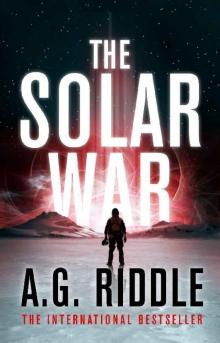 The Solar War (The Long Winter Book 2)
The Solar War (The Long Winter Book 2) The Extinction Files Box Set
The Extinction Files Box Set The Atlantis Trilogy Box Set- The Complete Series
The Atlantis Trilogy Box Set- The Complete Series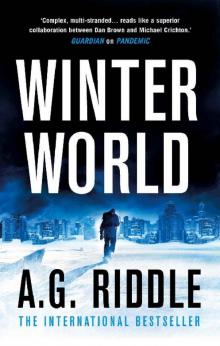 Winter World
Winter World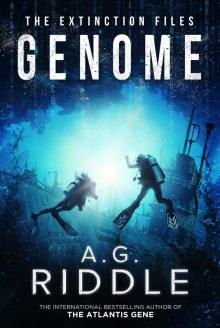 Genome
Genome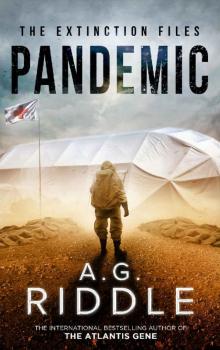 Pandemic (The Extinction Files Book 1)
Pandemic (The Extinction Files Book 1) The Atlantis Gene: A Thriller (The Origin Mystery, Book 1)
The Atlantis Gene: A Thriller (The Origin Mystery, Book 1) Departure
Departure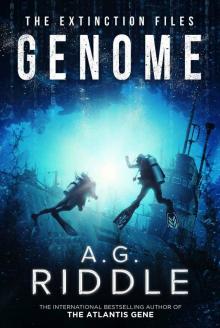 Genome (The Extinction Files Book 2)
Genome (The Extinction Files Book 2) The Atlantis World (The Origin Mystery, Book 3)
The Atlantis World (The Origin Mystery, Book 3) The Atlantis Plague: A Thriller (The Origin Mystery, Book 2)
The Atlantis Plague: A Thriller (The Origin Mystery, Book 2)